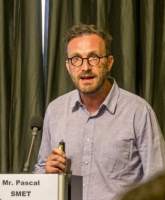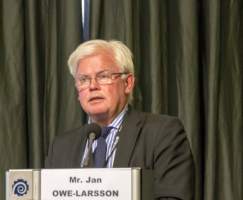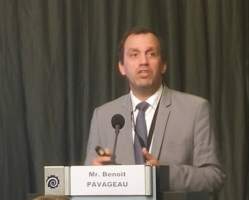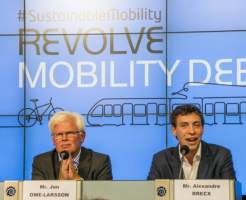 Share this!
Share this!The Sustainable Mobility Debate of REVOLVE took place in Brussels on Thursday 15 September 2016. Two panels and more than ten speakers advancing mobility solutions to reach a reduction of 50% in transport-related CO2 emissions by 2030. The opening speeches set the tone of the debate, introducing first the EU strategy towards low emission mobility (Edoardo Turano, DG Clima) and an advance of what would be a key question of the debate: how a mental shift is necessary to effectively achieve a model shift (Francois Bellot, Belgian Federal Minister of Mobility).
The first panel on how regions are showing the way towards sustainable mobility counted with four speakers. We were very proud to see three of our member regions sharing their experiences.

Pascal Smet‘s presentation shared the very inspiring story of how the Region of Brussels (BE) wants to shift from a city for cars to a city for people. A big challenge in a city where cars have being in the focus of urban design for too long time. With half of the citizens not owing a car and just 4% of the population riding bikes in the city, there lots of room for improvement, and the first steps have been already taken. Alessia Masini, from the city of Pisa (Tuscany, IT), presented the initiatives that the city has started to implement in order to manage the big influx of commuters from the region (the city has less than 100.000 inhabitants but receives 200.ooo visits per day). A bet for intermodality is their trademark: a cable car “the people mover” will connect the city and the airport, and the recently gained navigability of the Arno river will open access the sea.
 Jan Owe-Larsson spoke as chairman of the AER Working Group on Mobility and Transports, introducing the Assembly of European Regions and the work of the Committee 1 on developing sustainable regions. Afterwards he presented the case of Östergötland (SE). The region has achieved 100% renewable-fuelled public transport thanks to the use of biogas. But the challenge is now how to motivate the citizens to opt for the sustainable means of transport that are available for them. This requires a holistic approach, analysing the mobility needs of the population and identifying what triggers their behaviour, so we can make the public transport option the best one available.
Jan Owe-Larsson spoke as chairman of the AER Working Group on Mobility and Transports, introducing the Assembly of European Regions and the work of the Committee 1 on developing sustainable regions. Afterwards he presented the case of Östergötland (SE). The region has achieved 100% renewable-fuelled public transport thanks to the use of biogas. But the challenge is now how to motivate the citizens to opt for the sustainable means of transport that are available for them. This requires a holistic approach, analysing the mobility needs of the population and identifying what triggers their behaviour, so we can make the public transport option the best one available.
 Finally, Benoit Pavageau presented the specific challenges that the Canton of Geneva (CH) faces due to its location between he rest of the Helvetic Confederation and the French region of Auvergne-Rhone-Alpes. Cross border cooperation is the only way to vertebrate the territory in a sustainable way, solving the challenges of a mountainous orography and a complicated demography, with one out of three worker in the city center living in France. Developing the railroad system is the chosen option (Léman 2030 Strategy), a combination of duplicating both frequency and capacity of the network and linking the system with neighbouring areas through new railways to be built before 2030.
Finally, Benoit Pavageau presented the specific challenges that the Canton of Geneva (CH) faces due to its location between he rest of the Helvetic Confederation and the French region of Auvergne-Rhone-Alpes. Cross border cooperation is the only way to vertebrate the territory in a sustainable way, solving the challenges of a mountainous orography and a complicated demography, with one out of three worker in the city center living in France. Developing the railroad system is the chosen option (Léman 2030 Strategy), a combination of duplicating both frequency and capacity of the network and linking the system with neighbouring areas through new railways to be built before 2030.
 At the end of the first panel, the moderator (Alexandre Brecx from AER’s secretariat) engaged the regions in the most pressing question: how to overcome the resistance of people to change their habits and embrace sustainable mobility? Brussels advised to use the increase in quality of life as a driving force for change. However, it is never an easy path. Our societies are focused on immediate results and expect short-term satisfaction, making it a challenge for politicians to dare to take up big projects. They know the initial resistance will dominate public discussion. Mr. Smet’s recommendation was to listen to the citizens when preparing the project; once the decision is taken, politicians should keep the communication channels open but stick to the decisions taken. Mr. Owe-Larsson insisted on the need for politicians to take their responsabilities and to “make it happen“.
At the end of the first panel, the moderator (Alexandre Brecx from AER’s secretariat) engaged the regions in the most pressing question: how to overcome the resistance of people to change their habits and embrace sustainable mobility? Brussels advised to use the increase in quality of life as a driving force for change. However, it is never an easy path. Our societies are focused on immediate results and expect short-term satisfaction, making it a challenge for politicians to dare to take up big projects. They know the initial resistance will dominate public discussion. Mr. Smet’s recommendation was to listen to the citizens when preparing the project; once the decision is taken, politicians should keep the communication channels open but stick to the decisions taken. Mr. Owe-Larsson insisted on the need for politicians to take their responsabilities and to “make it happen“.
The second panel was moderated by Xavier Tackoen (Espaces-Mobilités) and it presented innovative technologies advancing sustainable mobility. Remi Lebeda (IRU) presented how innovations in road planning can lead to a reduction in fuel consumption; Umberto Guida (UITP) presented how the bus sector tries to change how it is perceived and become a key piece of the pool of available mobility solutions; Wolfram Auer (Dopplemayr Group) invited us to think in three dimensions and consider urban cars as a flexible, efficient and accessible solution that can vertebrate a city, as it has been proved in Caracas and La Paz; and Stephan Schultz (15 marches) advanced a future where cars will be electric, shared services, and autonomously driven.
The debate was closed by Alain Flausch, Secretary General of the UITP. All in all, a very inspiring and comprehensive event organised by our friends (and neighbours at the Renewable Energy House) of REVOLVE. Thanks for inviting the European regions to be part of it!
